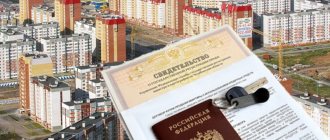When the privatization of housing was allowed at the legislative level, citizens began to do it en masse. So they got expensive property. Over time, some decided that they could not pay property taxes or were not satisfied with other aspects, then the question arose about whether it was possible to cancel the privatization of the apartment. This procedure is provided for by law - Article 9.1 of the Law “On Privatization” , and can be resorted to under certain circumstances.
Is it possible to cancel the privatization of an apartment?
Legally, privatization is not a final and irrevocable deal. By granting the right to transfer apartments into the ownership of citizens, the state retained their right to refuse the procedure. Moreover, citizens can suspend privatization at the stage of paperwork. But if the apartment has already been privatized, it can still be returned to the state: independently or through the court .
After privatization of housing, a person becomes its owner. He can freely dispose of his property up to its alienation (Clause 1, Article 209 of the Civil Code of the Russian Federation). True, if there are several apartment owners, they will have to come to an agreement and act together. It is impossible to cancel the privatization of only your share in the case of an apartment.
The right to cancel privatization is enshrined in Art. 9.1 of Federal Law No. 1541-1 “On Privatization...”, and here are the details:
- only participants in the procedure can terminate privatization;
- cancellation is available only once in a lifetime;
- children can refuse privatization only with the consent of the guardianship authority.
Thus, deprivatization in court is available to all participants in privatization. Actions must be voluntary, but not forced.
Status
Very often, the status of the property itself does not allow any transactions to be carried out.
This happens when the property has already been privatized earlier, or is in someone else's ownership.
Privatizing status. If it turns out that a person does not have any right to carry out privatization , this action becomes impossible.
Due care must be taken to determine whether there are legal rights to own and use real estate.
Illegal redevelopment . Often, in pursuit of beautiful and modern renovations, citizens carry out redevelopment of real estate that has not yet been privatized.
This action is illegal, because all changes that were made in municipal housing must be negotiated and agreed upon in advance.
You can find out whether it is possible to privatize a dorm room, as well as who has the right to repeat the procedure, on our website.
Is it possible to challenge?
In which cases?
Cancellation of the privatization of residential premises is the termination of the privatization agreement. The reasons for canceling a transaction can be very different, ranging from personal desire to a difficult financial situation.
Grounds for canceling the privatization of an apartment:
- the owner’s desire to part with the property;
- gross violations of the privatization process;
- unfair distribution of shares for privatized housing;
- ignoring the interests of one of the residents (for example, a child);
- participation in the privatization of an apartment repeatedly (see “How many times can you participate in privatization?”);
- detection of fraud in the signing of a housing privatization agreement;
- registration of an apartment using forged documents;
- recognition of one of the privatization participants as incapacitated (partially capable);
- violation of the technical condition of a residential property (illegal redevelopment).
Violations of the privatization process can only be challenged through the courts . At the same time, most cases of deprivatization are transferred to the jurisdiction of district courts. But there is an option for voluntary abolition of privatization.
Example: Pensioner Solovyova and her husband lived in a municipal apartment under a social tenancy agreement. Subsequently, the residents applied for privatization of housing and registered ownership of the apartment. 2 years later, Solovyova’s husband died. The woman was left alone, since the children had long grown up and lived in other cities. Solovyova’s pension was barely enough to pay annual taxes, utilities and major repairs. The woman decided to cancel the privatization and submitted documents to the local Housing Department. Reason: death of a spouse and difficult financial situation; inability to bear expenses for a privatized apartment. The application was considered and soon granted. The housing passed from Solovyova’s property back into the hands of the municipality. The pensioner entered into a rental agreement for an apartment and began to live in it under the same conditions. Housing costs have dropped significantly.
Legal consequences of transaction cancellation
Based on Article 9 of the Civil Code of the Russian Federation, the rules of ordinary types of contracts apply to canceled privatization transactions. In this regard, the legal consequences of declaring privatization invalid are the following events:
- Termination of a privatization agreement by compulsory judicial procedure.
- Returning the parties to the property positions in which they were before the conclusion of the privatization agreement.
- Privatized real estate passes into the hands of the legal owner.
If the court finds that the plaintiff suffered physical harm during the conclusion of the transaction or as a result of its conclusion, the court obliges the defendant to pay compensation to the victim in monetary terms. You can also demand compensation for moral damage, but it will be much more difficult to prove.
How to cancel the privatization of an apartment
Exiting the privatization of an apartment is not so difficult. It is enough to provide compelling arguments and send a request to the government authority. If there are no obstacles, it will be possible to cancel the privatization without a trial. The presence of complications and disputes between residents requires challenge in court. Let's consider both options.
Procedure
The voluntary procedure for abandoning a privatized apartment is the most common. The authorities do not create obstacles, but they may delay the procedure.
Step-by-step algorithm of actions (voluntary):
- Preparation of an application for deprivatization.
- Transfer of documents to the local administration.
- Waiting for a response from the municipality.
- Signing an agreement to return the apartment back to the state.
- Making changes to Rosreestr.
- Conclusion of a new social rental agreement for residential premises.
Identification of serious violations in the privatization process obliges the parties to go to court. This is the only way to invalidate the procedure. If you challenge the privatization of an apartment in court, then residents will be able to take advantage of the chance for free privatization again. Provided that violations actually took place.
Procedure (through court):
- Conduct pre-trial negotiations with the opposing party.
- Prepare a package of documents.
- Draw up a statement of claim for deprivatization.
- Pay the state fee.
- Give the package to the secretary of the office.
- Attend preliminary and main hearings.
- Obtain a court order.
- Contact the administration and cancel the privatization of the apartment.
- Record changes in Rosreestr.
- Re-sign the social rental agreement.
Participation in court hearings requires certain skill and legal knowledge. It is quite difficult to cope with the work alone. We offer you a free legal consultation. Our consultants will tell you when to deprivatize an apartment through the court and what to focus on when protecting your interests?
Procedure, process
The sequence of actions to cancel the privatization of an apartment depends on the chosen method: deprivatization (voluntary) or deprivatization (forced). Some steps are the same, so let's describe the general structure.
How to cancel the privatization of an apartment (step by step):
- Stage No. 1
The first step is to obtain the consent of all residents of the apartment. Deprivatization, like privatization, is a voluntary event. Consents are expressed in person and in writing. Then they are formed into a single package. If one of the residents refuses, the housing will have to be deprivatized in court.
- Stage No. 2
Contacting the local administration that issued the privatization permit. You will be given a receipt confirming receipt of the documents. The presence of all residents is not necessary - it is enough to choose one representative. Do not forget that in this case you will need a power of attorney.
- Stage No. 3
Signing an agreement on deprivatization of the apartment. The property will be returned to the municipality and will become available for living (if it is not dilapidated or dilapidated housing). The agreement is signed by all participants in the procedure.
- Stage No. 4
The final stage will be the conclusion of a new social rental agreement. Not necessarily for the transferred apartment - you can move into another housing if the municipality has free living space.
Expert opinion
Dmitry Nosikov
Lawyer. Specialization: family and housing law.
Often the parties have mutual claims - then it is necessary to go to court, where the apartment owners will cancel the privatization agreement. For example, in case of violation of the interests of a child or illegal retention of shares in an apartment. The initiator of a challenge in court can be any of the residents, and in some cases the guardianship authority or the administration (see “Deprivatization of an apartment, housing”).
Statement of claim (sample)
Going to court involves filing a claim for deprivatization of an apartment. The plaintiff must draw up a document in accordance with all the rules of civil procedural law. Any deviation from the norms will result in refusal to register a claim.
form for cancellation of privatization must include:
- name of the court (legal address);
- Full name of the plaintiff and defendant, their contact information (according to passport);
- a statement of the circumstances that led to the court;
- argumentation of the plaintiff’s position, reference to articles of the law;
- the applicant's basic requirements;
- list of applications (documents);
- date and signature of the plaintiff.
Everything that the applicant reports must be supported by documents. It is allowed to use all types of evidence: witness testimony, audio, photos, video materials, written evidence, etc. The stronger the arguments, the higher the chances of the privatization agreement being declared invalid.
Documentation
Before going to the administration or court, you need to prepare documents. The basic package will not differ from the one considered at the stage of housing privatization. But you need to attach a number of additional papers.
List of documents for deprivatization (deprivatization) of an apartment:
- copies + originals of passports/certificates for children;
- copy of the privatization agreement + extract from the Unified State Register of Real Estate;
- statement of the owner's personal account;
- a completed and signed application to cancel privatization;
- certified consent of the guardianship and trusteeship authority (if children are involved);
- certificate of family composition (persons registered in the apartment);
- extract from the Federal Tax Service on payment of property tax.
Copies of these documents are provided. But later you will need the originals. Therefore, it is worth making several copies in advance. When applying for deprivatization, the above list is supplemented with evidence that the plaintiff is right.
Initiators of cancellation
The legislation specifies a list of those persons who can claim to challenge the drawn up contract. Government agencies and individuals have the right to request cancellation. It is allowed to file a claim in court:
- those persons whose rights were violated because the transaction was carried out illegally;
- regulatory authorities of the state, this may be the prosecutor's office or the guardianship department;
- official representatives of those people whose rights were violated by the deal;
- to self-government bodies, if they previously owned the housing.
It is worth paying special attention to those situations when the contract is disputed by legal entities or regulatory authorities. The document that is drawn up gives the citizen the right to take possession of an apartment free of charge from another owner.
The transaction will be legal only if the other party is the full owner and can dispose of the housing.
There are some groups that can legally enter into an agreement on behalf of a legal entity:
- state-type unitary enterprises;
- any departments or organizations that own the building;
- local authorities;
- unitary enterprises of municipal type.
If the responsible person enters into an agreement, then he must have official authority to do so. To do this, there must be an order, instruction or resolution in hand that confirms the possibility of transferring property into the possession of another citizen.
Important! According to the law, transactions in which the privatization of official or departmental housing owned by a municipal unitary enterprise or state unitary enterprise are especially carefully considered. It is necessary to make sure that this property is included in the list of those buildings that can be privatized.
Price
Deprivatization is a free procedure . There is no need to pay the state to return the apartment back. Costs may be associated with obtaining certain types of certificates. For example, an extract from the Unified State Register of Real Estate about the characteristics and rights to real estate will cost 460 rubles. A power of attorney from a notary costs another 1,000 rubles, etc.
Forced deprivatization will cost the state fee for filing a claim. At the time of writing this article, it is 300 rubles (clause 3, clause 1, article 333.19 of the Tax Code of the Russian Federation). But this does not mean that there will be no more expenses. Everything is very individual and depends on the specific situation.
Is it possible to cancel the privatization of a share of housing?
Almost always, an apartment is privatized for several owners - father, mother, grandmother, grandfather, children... This form of ownership is considered shared. People own an apartment jointly, but can dispose of their shares.
Deprivatization (deprivatization) affects the entire apartment - the privatization of a share of housing cannot be annulled! All homeowners must write an application to transfer an apartment back to the state. If any of them is against it, the procedure is impossible. At least until the case is resolved in court.
What is deprivatization?
Unlike deprivatization, when housing is returned to the state at the request of the citizen, deprivatization is carried out through the court. During legal proceedings, the transfer of ownership of living space is recognized as invalid.
Through statements from owners. It is no longer possible to take such living space back into ownership.
There are many reasons for this:
- Owner's financial problems. When a citizen is unable to pay utility bills, tax contributions and other costs incurred by the owner of any home.
- To ensure that a number of citizens do not fall for the tricks of scammers. Pensioners and single people are always hit.
- Raprivatization often occurred in order to obtain larger housing. If a person has privatized a small living space, this deprives him of the right to apply for housing with a larger square footage.
Statute of limitations
Civil legislation has a generally accepted limitation period of 3 years (Article 196 of the Civil Code of the Russian Federation). The countdown begins either from the moment of the violation or from the date when the victim learned about the violation of his rights.
Deprivatization of housing is also subject to the general rules of limitation. Citizens have the right to go to court from the moment they become aware of the illegal privatization of an apartment . Consequently, they initiate the procedure for challenging, changing or canceling the privatization of the apartment. This is given for three years, after which the right to challenge in court no longer applies.
Example: The Chekhov family lived in a municipal apartment. The social rent agreement was issued for a man. The housing was occupied by three residents: a young couple and a 2-year-old child (from the wife’s first marriage). Chekhov was involved in privatization - it was he who prepared the application and submitted it to the administration. The guardianship authorities were informed that a child was participating in the privatization, but they did not notice that the minor’s share in the apartment was cut. Privatization took place - the housing became the common shared property of the Chekhovs and the child. 4 years have passed, the child is 6 years old. While accidentally going through the documents, Chekhov's wife learned that the child had not received his due share. The woman contacted the guardianship authorities. A representative of the PLO conducted an independent inspection and established the fact of a violation. Together with Chekhova, they filed a statement of claim in court with a request to review the terms of shared ownership, because It was not allowed to completely cancel privatization with the participation of a child.
This example shows that the limitation period begins not from the moment the privatization ends, but from the time when the violation became known. The requirements were satisfied by the court in full.
Can the results be challenged?
Unfortunately, the legislation does not have a clearly established normative act that would contain all the grounds for annulment, cancellation or any other way to invalidate the process.
There was no mention of this in other regulatory legal acts. Today we can be content with information about in which cases this action may fit the definition of illegal , as well as the time frame for appealing.
In this matter, it is very important to observe the concept of limitation of actions, which has been in Civil Law for a long time and is very suitable for this issue.
An entire regulatory legal act, called Federal Law No. 1541-1, is devoted to privatization itself.
You can find out whether it is possible to privatize an apartment with debts, a room in a communal apartment, cooperative, military or official housing on our website.
Refusals. Causes.
Deprivatization is the return of property back to the state (municipality). It would seem that there are no questions. And yet, there is a possibility of being refused to challenge the privatization of an apartment.
Main reasons:
- One or more homeowners are against deprivatization.
- The property is secured (for example, by a court or a bank).
- The owner of the apartment is a child under 14 years of age (see “How to privatize an apartment with a child?”).
- The residential property was sold/donated/inherited to other residents.
- After privatization, illegal redevelopment was carried out.
- A participant in deprivatization owns alternative housing, so it is unlikely that it will be possible to conclude a social rental agreement.
Thus, these grounds make it impossible to return the apartment back to the state. There is only one option left - to sell your home and move into a municipal apartment. But this is quite difficult, since you can’t just give up housing.
Briefly about the main points:
- Canceling privatization means returning the apartment back to the state.
- It is implemented in two forms: deprivatization and deprivatization. The first is considered voluntary, i.e. co-owners of their own free will return the housing to the ownership of the municipality. Deprivatization involves going to court to invalidate the privatization agreement.
- The main condition for deprivatization is the consent of all co-owners of the apartment.
- Deprivatization is possible in case of serious violations during the procedure, for example - misrepresentation, ignoring the interests of the child, fraud, unaccounted redevelopment, etc.
- The abolition of privatization leads to a change of owner - housing moves from private ownership to the municipal fund.
- It is prohibited to cancel the privatization of a share. Participation of all co-owners is mandatory!
- The administration may refuse to take the apartment back. For example, if redevelopment has been done in it, someone is against the procedure, or the housing has already become the property of third parties.
Before abandoning a privatized apartment, you need to weigh the pros and cons.
The main reason is to avoid expenses for housing and communal services, taxes, and major repairs. But it happens that some co-owners try to annoy others. Their goal is to deprivatize or deprivatize housing for their own reasons. For example, do not give away a share or deprive your spouse of the right to living space. It happens that people were deceived - and they want to restore justice by challenging privatization in court. There are so many situations and so many solutions. If you have any difficulties, contact the lawyers of our site. They will help you understand the problem, find ways to solve it, collect documents and justify your requirements. The participation of a lawyer saves time and effort. Don’t waste time searching for an answer to your question; it’s better to ask a lawyer and get a competent, detailed answer. Attention!
- Due to frequent changes in legislation, information sometimes becomes outdated faster than we can update it on the website.
- All cases are very individual and depend on many factors. Basic information does not guarantee a solution to your specific problems.
That's why FREE expert consultants work for you around the clock!
- via the form (below), or via online chat
- Call the hotline:
- Moscow and the Region
- St. Petersburg and region
- FREE for a lawyer!
By submitting data you agree to the Consent to PD Processing, PD Processing Policy and User Agreement.
Anonymously
Information about you will not be disclosed
Fast
Fill out the form and a lawyer will contact you within 5 minutes
Tell your friends
Rate ( 2 ratings, average: 5.00 out of 5)
Author of the article
Maxim Privalov
Lawyer. 2 years of experience. I specialize in civil disputes in the field of housing and family law.
Author's rating
Articles written
610











